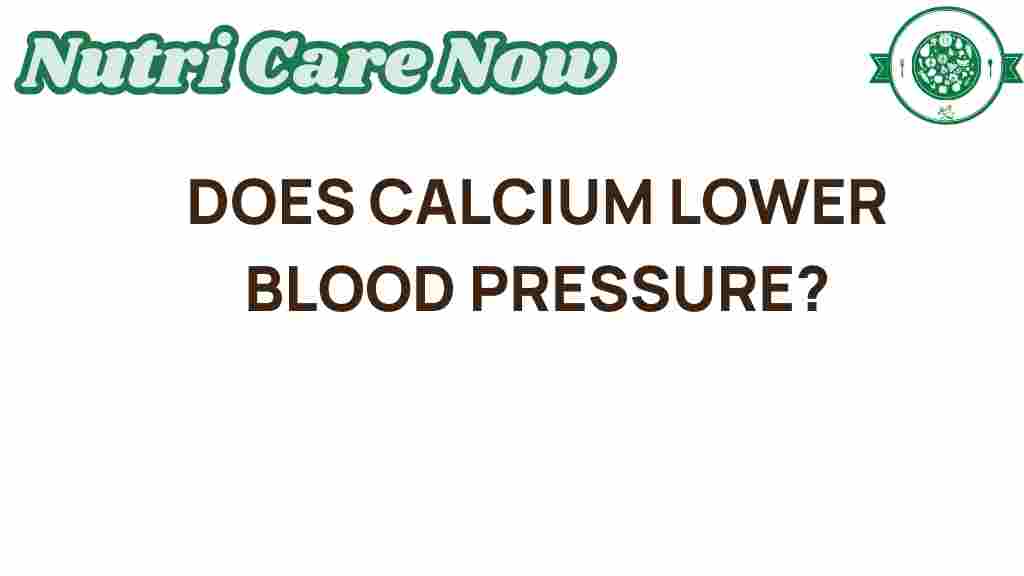The Surprising Link Between Calcium and Blood Pressure: What You Need to Know
When it comes to maintaining optimal heart health, many people focus on reducing sodium intake, increasing physical activity, and managing stress. However, one crucial mineral often overlooked in the discussion of blood pressure is calcium. Recent studies have unveiled the surprising link between calcium and hypertension, suggesting that this vital nutrient plays a significant role in regulating blood pressure. In this article, we will explore how calcium impacts health, the dietary needs for adequate intake, and practical tips for incorporating it into your nutrition.
Understanding Calcium and Its Role in Health
Calcium is not just a key player in bone health; it also contributes to numerous physiological functions in the body. This essential mineral is necessary for:
- Bone and teeth formation
- Nerve transmission
- Muscle contraction
- Blood clotting
Moreover, calcium influences various hormonal secretions and the health of blood vessels, which directly affects blood pressure levels. Understanding these functions is crucial for individuals concerned about their wellness and heart health.
The Connection Between Calcium and Blood Pressure
Research suggests that calcium plays a vital role in managing hypertension. The mechanism by which calcium affects blood pressure is multifaceted:
- Vascular Health: Calcium helps maintain the elasticity of blood vessels, allowing them to expand and contract efficiently. This elasticity is essential for normal blood pressure regulation.
- Nerve Function: Adequate calcium levels are crucial for proper nerve function, which can influence the contraction and relaxation of blood vessels.
- Hormonal Regulation: Calcium plays a role in the release of hormones that regulate blood pressure, such as vasopressin and renin.
Several studies have shown that individuals with sufficient calcium intake tend to have lower blood pressure levels compared to those who are deficient. This finding highlights the importance of calcium in the context of nutrition and health.
Recommended Dietary Needs for Calcium
The recommended dietary allowance (RDA) for calcium varies by age and gender:
- Adults aged 19-50: 1,000 mg/day
- Women over 50 and men over 70: 1,200 mg/day
- Children and adolescents: 700-1,300 mg/day, depending on age
It’s essential to meet these dietary needs to support overall health and wellness. Here are some excellent sources of calcium:
- Dairy products (milk, yogurt, cheese)
- Leafy green vegetables (kale, broccoli, bok choy)
- Fortified foods (orange juice, cereals, plant-based milk)
- Fish with bones (sardines, salmon)
- Nuts and seeds (almonds, chia seeds)
Incorporating these foods into your daily diet can help you meet your calcium requirements and support your heart health.
Tips for Enhancing Calcium Absorption
To maximize the benefits of calcium for blood pressure management, consider the following tips:
- Pair Calcium with Vitamin D: Vitamin D enhances calcium absorption. Ensure you get enough sun exposure or consider supplements if necessary.
- Avoid Excess Sodium: High sodium intake can interfere with calcium absorption and excretion. Aim to reduce processed foods in your diet.
- Limit Caffeine and Alcohol: Excessive caffeine and alcohol can lead to calcium loss from the body. Moderation is key.
Common Troubleshooting Tips
If you suspect you may not be getting enough calcium or are experiencing hypertension, consider these troubleshooting tips:
- Keep a Food Diary: Track your daily intake of calcium-rich foods to identify gaps in your nutrition.
- Consult a Healthcare Professional: If you have concerns about your blood pressure or calcium levels, speak with a doctor or registered dietitian.
- Consider Supplements: If dietary sources are insufficient, calcium supplements may be an option. Always consult a healthcare provider before starting any new supplement.
Conclusion
The link between calcium and blood pressure is indeed surprising yet crucial for anyone focused on their health and wellness. Adequate calcium intake supports not only bone health but also plays an essential role in managing hypertension and promoting heart health. By understanding your dietary needs and incorporating calcium-rich foods into your meals, you can take proactive steps toward better health.
For more information on managing hypertension through dietary choices, consider exploring resources from the American Heart Association. Additionally, you can learn about minerals and their effects on health through reputable health websites. Remember, a balanced approach to nutrition is key to sustaining optimal wellness.
This article is in the category Health and created by NutriCareNow Team
